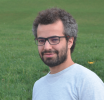François Pasteau
Ingénieur de Recherche
INSA de Rennes
Email :francois.pasteau@irisa.fr
Cursus
- 2008/2011: Thèse de Doctorat en Traitement du Signal et de l’Image, mention très honorable, à l’INSA de Rennes,
Laboratoire IETR – UMR CNRS 6164, Groupe Image et Télédétection
Sujet : Statistical study of a predictive codec for color images: a LAR-based robust and flexible framework
Directeur de thèse : Olivier Déforges – Co-encadrement : Marie Babel.
Soutenue le 10 novembre 2011, devant le jury composé de :- Bruno Arnaldi, INSA Rennes, PRU 27, Président,
- Jean-Marc Boucher, Télécom Bretagne, PRU 61, Rapporteur,
- Charly Poulliat, INP-ENSEEIHT Toulouse, PRU 61, Rapporteur,
- Frédéric Dufaux, Telecom ParisTech, DR au CNRS, Examinateur,
- Didier Nicholson, Thalès, Ingénieur de recherche, Examinateur,
- Marie Babel, INSA de Rennes, MCF 61, Encadrant de thèse,
- Olivier Déforges, INSA Rennes, PRU 61, Directeur de thèse.
-
2005/2008: Ingénieur Electronique et Informatique Industrielle Institut National des Sciences Appliquées (INSA) de Rennes (35)
Activités de recherche
Suite à mes travaux de thèse portant sur la compression d’images, j’ai orienté ma thématique de recherche vers la robotique d’assistance à travers le montage du projet APASH (Assistance au Pilotage pour l’Autonomie et la Sécurité des personnes Handicapées). Suite à l’acceptation de ce projet, j’ai rejoins en septembre 2012 l’équipe Lagadic de Inria Rennes en tant que Ingénieur de Recherche et responsable scientifique APASH pour l’INSA.
Le projet APASH a eu pour objectif de développer un module embarqué pour fauteuil roulant électrique. Ce module permet, à l’aide d’un réseau de caméras et de capteur à ultra son, d’assister le déplacement des personnes handicapées, notamment pour le franchissement de porte.
Ma formation initiale en Informatique Industrielle m’a permis dans ce contexte d’appréhender les problématiques de l’embarqué et des systèmes temps réel. De plus, mon doctorat en traitement de l’image m’a permis d’avoir un point de vue innovant sur la thématique de la robotique d’assistance. Ces travaux concernant la détection de portes ont fait l’objet de 2 articles en journal international et de 4 articles en conférence international avec comité de lecture.
D’autre part, j’ai contribué à l’Action d’Envergure Nationale Personally Assisted Living (AEN PAL). A ce titre, j’ai été référent plateforme Robotic Operating System (ROS) pour l’équipe Lagadic au sein de l’AEN PAL. Je me suis occupé d’autre part de la conception et du développement de la plateforme matérielle et logicielle du projet APASH.
Suite à la réussite du projet APASH, un fond de maturation a été financé pour permettre de continuer les travaux sur le fauteuil et de permettre le transfert technologique de la solution vers l’industriel Ergovie. Ce projet de maturation dénommé HandiViz m’a permis d’améliorer la solution qui avait été développée dans le projet APASH en l’optimisant, la robustifiant et en la testant en situation réelle. J’ai ainsi pu mettre en oeuvre une série de test avec 25 patients souffrant de pathologies différentes au pôle Saint Hélier à Rennes. Ces travaux ont donné lieu à 2 publications en conférence international, un dépot de code APP et 2 brevets internationaux. A partir des tests cliniques qui ont été réalisés, une autre publication au journal CVIU a été acceptée.
Suite à la réussite du transfert technologique, j’ai été embauché en 2015 par la société Ergovie dans leur cellule de recherche et développement en tant que responsable R&D. Cette position au sein de la société m’a amené à gérer 3 ingénieurs afin de mettre en place la commercialisation de la solution d’évitement d’obstacle. En 2016, j’ai été responsable pour la société Ergovie du montage d’un projet européen Interreg Va, en collaboration avec des industriels et des laboratoires en France et en Angleterre. Ce projet a pour but, d’une part, de concevoir un fauteuil roulant électrique intelligent capable de se déplacer de façon autonome en intérieur comme en extérieur et d’autre part de concevoir un simulateur de fauteuil roulant électrique en Réalité virtuelle permettant une meilleur préconisation des fauteuils au primo accédant.
Je suis également chef de fil du projet PRISME labelisé par le Pôle Image et Réseau en collaboration avec l’INSA de Rennes et le Pôle de rééducation physique Saint Hélier à Rennes. Ce projet a pour but de faire communiquer un fauteuil roulant et un lit communiquant afin d’assurer un suivi du patient tout au long de sa journée.
En parallèle de ces activités de recherche, j’ai pu être confronté, durant mon temps d’activité au sein de la société Ergovie, aux difficultés que représente la mise sur le marché de technologies relevant de la norme dispositif médical sur un marché de niche tel que le marché du handicap. Suite à la fermeture de la société Ergovie, j’ai été embauché en tant qu’ingénieur de recherche par l’INSA de Rennes afin de continuer à mener mes travaux autant sur le projet européen ADAPT que le projet PRISME.
Plus récemment, j’ai travaillé à la mise en place d’une collaboration de l’INSA de Rennes avec la société italienne ItalDesign afin de concevoir un véhicule innovant de déplacement pour personnes en situation de handicap. Ce nouveau véhicule sera présenté lors des Jeux Paralympiques de Tokyo en Septembre 2020.










